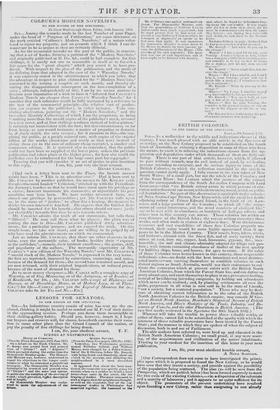COLBURN'S MODERN NOVELISTS. TO TILE EDITOR OF THE SPECTATOR.
13, Great Marlborough Street. Friday, IGth January 1831.
SIR—Among the remarks made in the last Number of your Paper, under the head of " Progress of Publication," are some strictures on the work entitled "Colburn's Modern Novelists," of a nature calcu- lated to injure my property, and on grounds which I think I can de- monstrate to be as unjust as they are certainly illiberal. As for the occasional mistake on the part of the public, in conceiv- ing that a set of books, forming a portion of the " Modern Novelists," and originally published at U. 1 Is. W., could be had complete for four shillings, it is surely not one so reasonable in itself as to furnish a fair cause for the " great chagrin" which you assert it to have pro- duced. With respect to the plan of the publication, and the mode of its differing from that adopted in the case of the " Waverley Novels," it was expressly stated in the advertisement to which you refer. that the advantage in respect to plan claimed for the " Modern Novelists," consisted in the issuing a complete set each month, and therel y ob- viating the disappointment consequent on the non-completion of a story ; although, independently of this, I am by no means anxious to disavow your imputation of a wish to have it " inferred that (!oreenN's Modern Novels are cheaper than CA DEWS Waverley Novels," for I consider that such inference would be fully warranted by a refel time to the test of the commercial principle—the relative cost of produc- tion (or expense to the publisher), in either instance. Your con- cluding observation, pointing out the " Modern Novelists," and the two other Monthly Collections of which I am the proprietor, as being " nothing more than the unsold copies of the publisher's stock, reissued in a new cover, and at four shillings a volume instead of half-a-guinea," is certainly not inconsistent with the fact ; but that circumstance, so far from being, as you would insinuate, a matter of prejudice or demerit, is, if jairty stated, the very reverse ; for it amounts to this—the sup- plying the public, at a greatly reduced rate, with copies of the original edition of the works (hand.ionle and costly as that was) instead of giving them (as in the case of ordinary cheap reprints), a smaller and commoner edition. It is material also to remember, that the public could not have been so supplied at the lower price, unless the previous publication had taken place at the higher price ; for how else could the publisher ever be reimbursed for the large sums paid for copyright?
'frosting that you will consider it an act of justice to give insertion to this reply, I am, Sir, your very obedient servant,
HENRY COLBCKS.
[ Had such a letter been sent to the Times, the laconic answer would have been, " This is an advertisement." Had it been sent to Mr. ComaiRN by another publisher, his answer to Mr. KNIGHT (vide the advertisement headed " Criticism," stitched up with the Periodicals for January), teaches us that he would have stood upon his privilege as a clean!, however inaccurate his statements, or unjustifiable his per- sonalities may have been. We have neither misstated facts, nor abused our privilege by personalities ; yet Mr. CoLituRs calls upon us, in the name of " justice," to allow hint a hearing, the moment be thinks his own interest is touched. Ile expects that the Golden Rule should be inverted for his benefit—that others should act more justly (or charitably) towards him than he acts towards others. Mr. COLBURS admits the truth of our statements, but calls them " illiberal." Ile may call them what be pleases : the plain way of putting the case is this—Mr. COLBURS 1111H:41A tricky advertise- ments, for a particular 'purpose, and we exposed the trick. On this simple issue, we take our stand ; and are willing to be judged by all who have read the advertiselnents on which we commented.
Let us inform Mr. COLBURN, that there are other elements in the value, even the mercantile value, of books, besides their " expense to the publisher,"—namely, their intrinsic excellence ; the genius, skill, and popularity of the authors. The mercantile superiority of Mr. CAHELI:5 " new edition of the Waverley Novels," over Mr. CO1.131710:4 " unsold stock of the Modern Novels," is expressed in the very terms : the first are reprinted, improved by corrections, engravings, and notes, because of the demand for them—the second have remained unsold, and are now reissued, with their original imperfections, at reduced prices, because of the want of demand for them.
As to mere money cheapness—Mr. CADELL sells a complete COpy. of Waverley, or of Guy Mannerly, or of the Antiquary, or of kanhoe, or of Kenilworth, for 10s. ; Mr. COLBURN sells a copy of Highways and Byways, or of Brembletyc House, or of Herbert Lacy, or of Flirta- tion(!) for 125.—CADELL gives you the Legend of Montrose for as. ; Couteitar asks 8s. for Yes and No.—ED.]






















 Previous page
Previous page